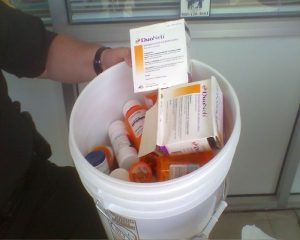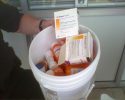Police Department took in more than 3,000 pounds of unused and unwanted drugs in 2015.
However, it was not due to seizures, instead the public just handed the drugs over to law enforcement with no questions asked, by participating in several “Drop the Drugs” events this year. In fact, during the month of December alone, 111 pounds of prescription medications were collected at three county locations. One possible reason for the high collection rate may have been the addition of a secure lock box at police headquarters allowing for drug drop off at any time. Calaveras County Sheriff’s officials are already planning “Drop the Drug” events for next year and provide these reasons why the program protects the community:
- Wastewater treatment facilities don’t destroy pharmaceuticals that are flushed. Most drugs pass through treatment plants and into our surface, ground, and marine waters.
- Trash disposal is not secure– especially for narcotics and other highly addictive and dangerous drugs. Even if pills are crushed or adulterated before they’re thrown in the trash – which is a dangerous practice itself – the drugs retain their biological and chemical activity and can still get into the environment. Trash disposal simply puts the environmental problem of these persistent toxic chemicals onto future generations.
- Pets can be poisoned by medicines thrown in the trash. The Animal Poison Control Center handled more than 46,000 cases in the U.S. of pets exposed to medicines in 2009. (ASPCA)
- Toxic leftover medicines are household hazardous waste that should not be put into landfills.
- High temperature incineration at properly permitted facilities is currently the safest disposal method for toxic leftover medicines. That is how the pharmaceutical industry disposes of their unwanted medicines.


